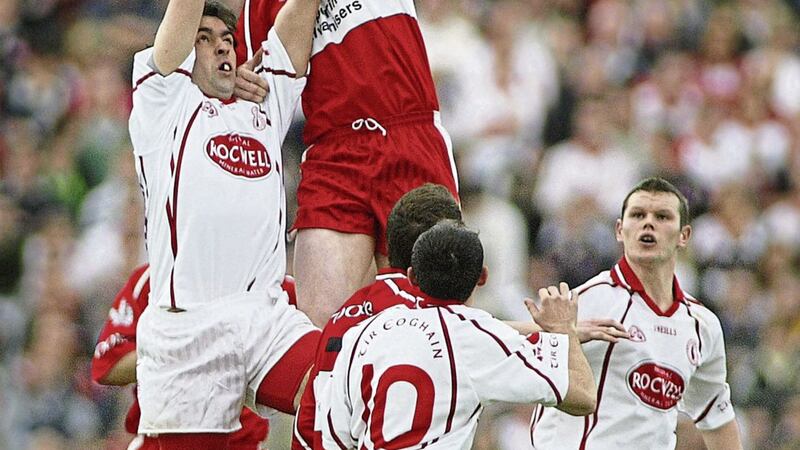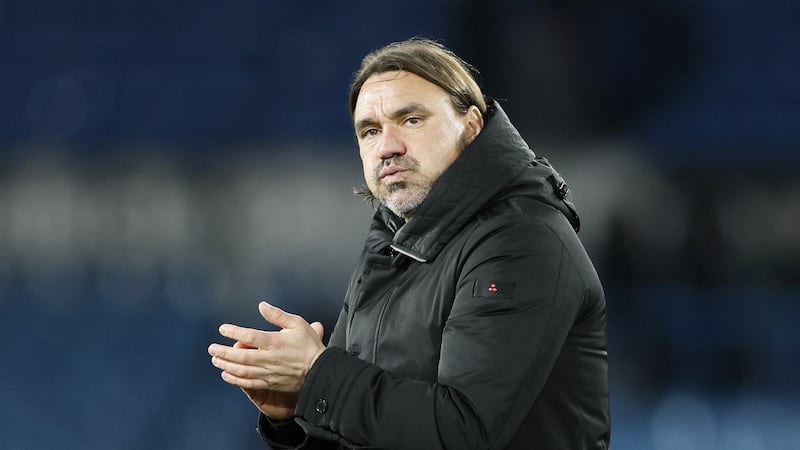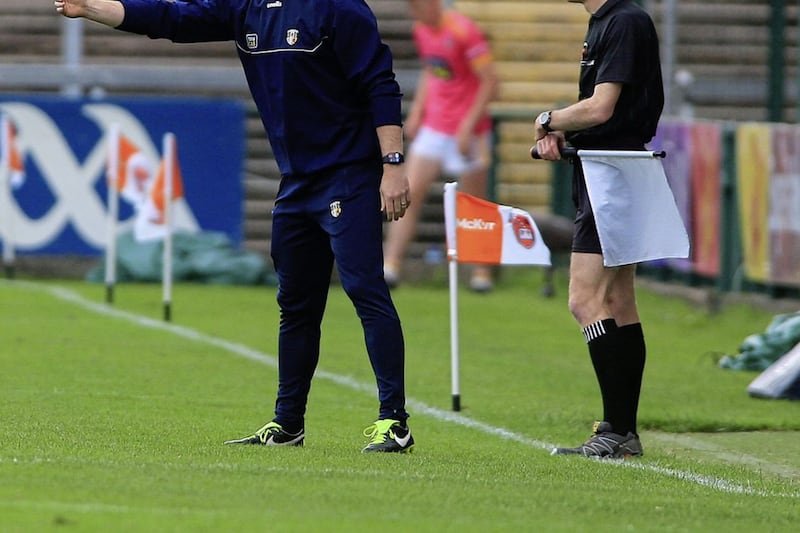TYRONE v Derry. It still has a ring to it. Everyone associated with the game in the two counties will have their own personal memories.
For me, the seminal moment was in Clones in 1995. As we burnt under the early summer sun, the game before us flared, roared and moved like a wildfire. Tyrone, down to 13 and behind on the scoreboard. Peter Canavan in his pomp.
I’d say Anfield was something else the other night, but I wouldn’t have swapped it for Clones all those years ago.
Other chapters are just as easy to recall but, from a Tyrone point of view, much less pleasant. Among them, Healy Park 2006, Tyrone, reigning All-Ireland champions, held scoreless in the first half as Derry completely outfought and outfoxed us. How Derry enjoyed that one...and rightly so.
I’ve no doubt that 2006 victory will be somewhere in the mindset of the Derry camp heading into this weekend’s encounter.
The same favourites’ tag for Tyrone, the same ‘home comforts’, the same result would do nicely for the Oak Leaf men. Coming into that 2006 match, I remember well the pre-match meeting in Kellys Inn.
It was there that a new ‘diamond formation’ was rolled out. Due to the calamitous performance that followed, the ‘diamond formation’ is now infamous within that Tyrone group.
The fact that the matchday meeting was the first time it had been spoken of in-depth was out of kilter with Mickey Harte’s normal meticulous preparation.
The formation made perfect sense on paper, but given the performance level we produced, and the approach Derry brought, it became an irrelevance in what was possibly that Tyrone’s team’s worst ever performance.
On reflection, there was probably a belief that while Derry were a decent side, we had two
All-Ireland medals in our pocket, had hammered a similar Derry team in 2004 and had put in a strong Division One campaign that spring.
Such facts and our football
know-how, gleaned from the
All-Ireland campaigns would have meant there were no ominous signs on the horizon as we headed towards Omagh.
The mood of calm, ordered preparation and logical approach to our play and the match in general was likely in contrast to the atmosphere within the Derry camp.
Like any half-decent GAA team, they would’ve relished the long grass and would’ve been ready to outwork, hit and harry Tyrone, driven by the chance to knock their vaunted neighbours off their perch.
Their manager that day, Paddy Crozier, had, one month earlier, led his backroom team as they stepped down from their posts en masse following a dispute with the county board over fixtures. Reappointed after peace talks, the bond in the group would have been tighter than Derry teams at that time usually were.
As they crossed Ballinderry Bridge into Tyrone, the team bus stopped and he played a motivational DVD of previous Derry-Tyrone meetings, which I’m sure wasn’t exactly a homage to Tyrone.
As he said himself, the boys would’ve been ready to walk to Omagh after that video.
To top it off, Crozier’s Ballymaguigan club-mate and long-time friend, Eamonn Coleman, at that stage undergoing chemotherapy, visited the Derry changing room to deliver a
pre-match oration.
The Derry boys were on a mission.
Into the brewing firestorm came a Tyrone team playing their first Championship game without their spiritual leader, Peter Canavan, while 2005’s primary attacking weapon, Stevie O’Neill, and conductor-in-chief Brian McGuigan, were both out injured.
On top of the motivational end of things, Derry had identified Tyrone defenders Conor Gormley, Philly Jordan, Davy Harte and Ricey McMenamin as Tyrone’s key attacking platform, on which, especially without the aforementioned attacking trio, they would be much more reliant. Derry rightly targeted them. Every time they thought about moving, the runs were blocked or they were fouled.
Derry pulled numbers back so that, rather than chasing back after the marauding defenders, they got back and choked off Tyrone’s usual running game. It was simple and thoroughly effective.
On top of all this, add the fact that Kevin Hughes got sent off after 17 minutes and Sean Cavanagh went off injured and suddenly the resultant defeat is somewhat less surprising.
While Tyrone were missing their attacking diamonds, Derry had probably their best full-forward line for a generation with Eoin and Paddy Bradley teaming up with Enda Muldoon.
In the end, the fact that Tyrone failed to score in the first half as All-Ireland champions is an oddity rather than a key event. Tyrone would’ve scored but for some badly off-target and out-of-character shooting but the bottom line was that, while Tyrone were thinking about the game and their shape, Derry were preparing for battle and, having spotted the weaknesses, had ripped under Tyrone’s skin and not let up.
The very recollection of such things makes me uneasy regarding Sunday. Yet there are, of course, obvious differences.
Tyrone and Derry competed in Division 1A and 1B in the spring of 2006, this year it was Division One and Division Four.
Unlike 2006, Tyrone are virtually at full strength while the modern game itself makes underdog victories seem less likely, such is the gap between the top teams and the rest.
Mickey Harte, uncharacteristically for a GAA manager, has admitted that Tyrone should win because they are simply playing at a higher level and are at a different stage of development.
He wasn’t disrespectful of Derry in saying this, he was stating facts and displaying a level of confidence in his team’s preparations and consistency that, if correct, should prevent any repeat of the non-performance in 2006.
Derry, however, will once again relish their chance. I have no doubt that Derry will have identified a weakness in Tyrone’s much-talked-of new attacking strategy.
After so much talk and excitement regarding the long-ball game employed so effectively by Tyrone to inside men like Mattie Donnelly and Cathal McShane, it should be remembered that this strategy is a simple one that, for a long time, was relatively easy to shut down, especially by keeping a defensive screen in place.
It will be critical for Tyrone to expect the unexpected from Derry. That long ball may or may not come off. They will need to be flexible and combine elements of their running and long-ball game, as well as slower more patient multi-phased build-up play.
In the end, though, all Championship football, especially in this part of the country, has a first and golden rule: you have to meet fire with fire.
If Tyrone match, or as Harte will demand, surpass Derry’s work rate, hunger and physicality then Tyrone will feel the football will look after itself.
In 2006, Tyrone failed this basic test and the die was cast.
I don’t expect a repeat lesson but then, it’s Derry v Tyrone – scripts are not always followed.







